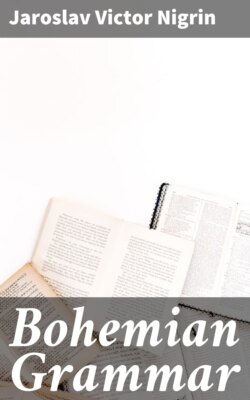Читать книгу Bohemian Grammar - Jaroslav Victor Nigrin - Страница 3
На сайте Литреса книга снята с продажи.
PREFACE.
ОглавлениеTable of Contents
In preparing the present work it has been my aim to present to English speaking people a practical text book of the Bohemian language written along modern lines, explaining the grammatical principles and supplying enough exercises to illustrate them. As far as I am aware there are only two other books published on the same subject in English:—Chas. Jonáš “Bohemian Made Easy” a book based on conversational method and Grammar of the Bohemian language by W. Morfill, a very brief work destined for philologists rather than general students. As Jonáš’s book is out of print, and, as there is quite a demand for a practical text book of Bohemian among businessmen and students—Bohemian is at present taught at several Universities and High Schools in the United States—this work was undertaken.
The basis of this work was “Mluvnice česká” by Dr. Jan Gebauer, this being the standard Bohemian Grammar sanctioned by the university of Prague. My task was to arrange, to present the facts of the language given by Gebauer in such a way as to make its study most easy, practical and palatable. To accomplish this aim I have used my own experience and also followed suggestions given in various methods employed in the teaching of modern languages, in order that the book may be of assistance not only in a class-room but also in private instruction.
It is perhaps needless to point out that the first part, dealing with phonetics is very important, because, if the student obtains a correct pronunciation at the very outset, he will have made considerable progress in understanding and making himself understood. It is further recommended that the oral exercises be really practised orally—eventually by the entire class in unity. Learn the language by ear and eye! To the exercises from Bohemian into English very soon are added small articles, fables, stories and poems, which bring the student in touch with the living language and not only with prepared grammatical examples. It is certainly an easier and a surer way to learn correct Bohemian by reading and hearing as much as possible of good Bohemian than by making translation from English into Bohemian. Therefore, the exercises given in Bohemian are more numerous than those in English. Repetition makes mastery, and I did not hesitate to repeat a point that seemed to me to be important and the student ought to return again and again to such sections which are more difficult and also more important.
Bohemian is a highly inflected language and presents a great variety of forms. I tried to simplify the study of this multitude by systematizing, by linking and uniting similar forms and by gradually introducing the question of declension and verb forms. The part dealing with idiomatic expressions and syntax is not as complete because I had not enough material on hand. This present work is to a certain degree a pioneer work and as such has had its difficulties that could not be mastered in a comparatively short time and with insufficient material. The book was written during the Great War, when it was impossible to obtain the aid of authorities in Bohemia. However, I wish to express my indebtedness to the following works consulted in my present work: Rádce správné češtiny: Peter Zenkl; Škola českého jazyka, Říha, Heyduk, besides the already mentioned works of Gebauer, Morfill and Jonáš. I wish also to thank most sincerely the following kind helpers: my colleague Boh. Kral, Mr. Josef Mach, Dr. J. E. S. Vojan and Miss Marie Novak who helped in the compiling of the dictionary and especially Miss Katherine Kiely for painstaking revision and help in proof-reading.
I hope, that the included paper by Mr. A. R. Nykl, on the “Slav Nations and their languages” will help to awaken interest in Slavic philology. It will also show that by studying Bohemian—a language of 10,000,000 people—of whom about a million are living in the United States, we are really getting in touch with a race of almost 150 million souls, a race that is comparatively youthful on the horizon of the history of mankind and undoubtedly a race with a bright future.
I sincerely hope that this present work will help to foster the study of Bohemian and that it will awaken interest in the literature and culture of my native land.
Chicago, August 18, 1917.
Jaroslav Victor Nigrin.
